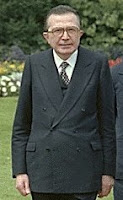
If you care much about film and its future; about what can be done to bring to imagined life a still-living, quite powerful and frightening ex-head-of-state, who remains about as private a personage as you're likely to encounter; and about how riveting visuals can hold you fast, even while events and people you don't fully understand are flashing by at breakneck speed -- then line up Friday to experience IL DIVO.
As all of the above is happening, you are likely to cling, as the film itself does, to writer/director Paolo Sorrentino's ace-in-the-hole: his leading character Giulio Andreotti, an Italian politician whose career has spanned a half-century and who has been accused, tried and convicted of everything from murder to conspiracy and has yet to serve a day in prison. In fact, the fellow is now serving as a "Senator for Life." As played by the award-winning actor Toni Servillo (unrecogniziable here from his role in Gomorrah), Andreotti is the eye of the hurricane. Unnervingly quiet while all about him are rushing, screaming (or dancing the frug), he maintains his calm and keeps his own counsel. Already enormously decorated (for this and other roles), Servillo deserves every award in the book for his look-alike/bone-deep recreation of Andreotti. (The real Giulio is shown below, left; Servillo's version appears at right.)
  |
 |
Sorrentino's film opens this Friday, April 24, in New York City at the Lincoln Plaza Cinemas and at Landmark's Sunshine Cinema. I presume some sort of limited-release, national-rollout will follow soon. It had better or expect a film-fan mutiny.
 |
While chatting with the two women prior to the interview, I learned that Sorrentino has actually shown his film, at a private screening, to its leading character "Senator for Life" Giulio Andreotti, and that Andreotti had not -- surprise! -- been pleased. In fact he threatened to walk out, but then stayed for the entire film (How could he leave? Il Divo's too riveting!) while particularly hating and complaining about the scene in which his character "confesses" -- which is one of the many smart and richly imagined pieces in this fascinating puzzle of a movie.
TrustMovies: It seems to me that your film is a character study more than anything else -- about a man whom we cannot know completely because he is so closed. But you get into him by imagining what is going on.
Paolo Sorrentino: One of the things most important in the film is this study of the character because I was very curious, very intrigued, by his character because he was so mysterious and so hard to understand. When it is so hard to understand a person, you study about what you can. So I finished with what I could study and then I invented something which I felt was reliable… about him.
  |
The wife (Anna Bonaiuto, left) and the secretary (Piera Degli Esposti).
It stuck me a reliable. Even if it is not exactly true, perhaps it can still be reliable.Ah, yes. I hope so.
Your movie made me want to be an Italian so that I could more fully understand all the ins-and-outs of the people and the politics. But Il Divo also made me grateful I was not an Italian so that I didn't have to live under the power and control of "leaders" like this. Of course, we did live through Mr. Bush over here… (Sorrentino laughs) But it is not the same.
No, it is not the same.
Bush had his eight years, but this guy has had…. fifty?
Italy, I think, is a rather strange country for democracy.
Why?
Because I think that democracy has not completely developed here. Italy has one foot in the west, but its other foot in some country like the third world or like Latin America. So we have what we call two shoes in different situation. For example, the fact that Andreotti has now been made a "senator for life" is something like a dictatorship. And so we weave between, hmmm, the United Kingdom and… Zimbabwe.
 |
From Il Divo: the Andreotti entourage
When I was watching the film, despite all the evil things that Andreotti was doing, I kept thinking, Wow-- this could be a great man! But he has gone greatly wrong. Does that make sense?
That is true because there is a greatness in Andreotti. Certainly he is greatly fascinating. And evil is greatly fascinating.
But Andreotti had such skills in surrounding himself with this cadre of powerful people and making use of them so well for his own purposes. This is certainly a skill. We hope Obama will have such skills -- but will use them toward better ends.
I think this happens when you have a man who loves power for the sake of power and not for the greater good. I believe that Andreotti is a kind of man who loves the power and so all his actions are finalized around the idea to hold onto this power. Not for so much money or women. Just for the power.
And this is what your movie explores so well.
I hope that my film will really be seen by an international audience, not just by Italian people, because this characteristic of power and its use is common to many other statesman and in many other countries.
I think the film has a very good chance of doing this because of your visual skill. I have never seen scenes like this in any other movie: the cat in parliament, the night club scene in which everyone is dancing and Andreotti is just there, so quiet, like a center of stillness that rivets your attention. And your actor, Toni Servillo, is amazing. I have never seen a performance like this. It is memorable.
Yes, Andreotti is still -- in a world that moves very fast, yet he is always very calm and very private. This is part of his fascination.
There is a scene in which you come in very close in on Andreotti and his wife -- you can see the pores of their skin! I have seen things like this done in other films but not in the same way, not accomplishing as much.
That was the idea: for me -- for the wife, too -- to know very well who he is. So we have to go close in!
 |
In Il Divo, a kidnapped Aldo Moro haunts Giulio's dreams.
How did you choose you music? We never hear Sibelius very much in films and it's wonderful to hear him again and used like this. And rock songs too -- what a great combination of classical and popular!During the writing of the film I heard this music, both the classical and the rock, and I found out that they work very well together. So I decided to combine them.
How do you get to your visuals? Do you storyboard them? I'm asking because I've never made a movie, and I don't know how things get from the mind of the moviemaker onto the screen --and particulary in a format so spectacular as you have here. This is the kind of film where people will leave the theatre and immediately go screaming to their friends, "You've gotta see this movie, you've gotta see this movie!" (Sorrentino laughs, and I ask the PR representative Susan Norget, who is sitting across from us). Don't you think so, Susan?
Susan Norget: Well, we hope so!
So, what's next for you? Tell me about La Partita lenta, your short film that I found on the IMDB?
La Partita lenta is a short film that I did for an Italian bank. Two other directors did this, too. The bank called us and proposed that we make …
A commercial?
It's not a commercial because we don't do a commercial about the bank. The bank helps finance movies because they want to do sort of … some thing humanitarian. To promote the arts.
Ah, yes, banks always love to promote the arts!
Yes! (he laughs) We pretended to believe them and we did it.
Will we get to see this?
Yes, the film is on YouTube. Go there and ask for La Partita lenta.
Is it subtitled?
There is no dialog -- well, only one word.
 |
Massimo Popolizio, as "The Shark," has second thoughts.
Do you know Salvatore Maira's film Valzer ?
No, I didn't see the film but I know Salvatore Maira.
You should see it. It's another great Italian movie.
I don't think it got such a good distribution in Italy.
No, I don't think so. But maybe now with your film and Gomorrah and some others, we'll see a deserved resurgence of Italian film?
I hope so.
Thank you so much for your time, Paolo. And for your help in translating, Lilia.





No comments:
Post a Comment